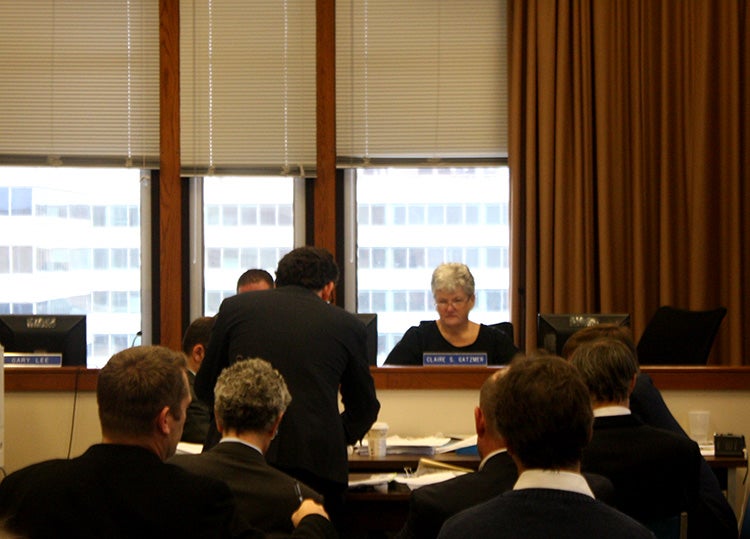40th & Pine demolition case churns on in a painfully ado, sort of way

On Thursday, November 1st, 2012, in a small room at the top of the City of Philadelphia building, on the corner where the Benjamin Franklin Parkway intersects with 16th and Arch streets, almost nothing happened. Despite specially scheduling a full-day hearing on the matter, the Board of L&I Review did not make a ruling regarding an appeal of the Historical Commission’s May decision to permit the demolition of a historic mansion at 40th and Pine.
Nothing began happening when a member of the Review Board did not show up at 10 a.m., when the hearing was scheduled to begin. The hearing was postponed until noon, and did not begin until 20 after.
Attorneys for the applicant—the University of Pennsylvania, which owns the parcel—did not begin their case. The meeting was adjourned after four hours, during which Paul Boni—the attorney for the appellants, including Woodland Terrace Homeowners Association—was able to call two witnesses. The next hearing date was not immediately scheduled.
What follows is a brief description of the few things that could be said to have happened, arguably, at Thursday’s hearing.
- Paul Boni gave an opening statement, arguing that the Historical Commissioned had approved the permit for demolition in error. He said that Penn’s application provided a lot of information, but did not meet the requirements laid out in the City’s Historic Preservation Ordinance. Boni said that Penn had showed that the historic building was not useful for their purposes, but that it failed to show it was not useful for others’ purposes. He argued that Penn had not made enough of an effort to market the building for sale.
“The law requires not just that you prove that the property won’t work for you, but that it won’t work for anybody,” Boni said. He said the applicant had to show that the historic designation “removes all reasonable use of the property,” not just the type of redevelopment the applicant would like to see.
- Matthew McClure, an attorney for Penn, and Andrew Ross, an attorney with the City’s Law Department, objected to Boni’s opening statement, saying that he was acting as a witness by elucidating the contents of the documents he planned to present as evidence. Ross said that it was “not counsel’s job to tell the Board what’s in the documents.”
- The Board allowed Boni to continue, instructing him to “highlight, without characterizing” the portions of the documents he wanted the Board to pay attention to.
- Boni called Richard Tyler, a former director of the Philadelphia Historical Commission, as a witness. Tyler said that current Commission Director John Farnham’s presentation during the May hearing was incomplete. He said it failed to distinguish between non-profit and for-profit applicants for hardship.
- Ross and McClure said that Tyler’s testimony amounted to a plea for the Board to give more weight to his opinion than to the Historical Commission’s.
- Boni called Guy Laren, a real estate developer, to testify about the feasibility of redeveloping the historic mansion. Laren said that the “ownership structure” Penn wanted to employ—in which it would own the parcel, contract a developer to build on it, and lease the new building—is only one of several options available for redevelopment.
- McClure and Ross objected to his testimony, saying he was practically testifying as an expert witness, though his expertise had not been established.
- The meeting adjourned around 4:30 p.m.
Paul Boni summarized the hearing thusly: “We had two witnesses. The first, former [Historical Commission] director Dick Tyler, testified about the law of financial hardship, and why and how the Commission erred in this matter. And the second witness was a real estate developer who testified that this mansion can absolutely be saved at a reasonable cost, and should be.”
The attorneys on either side disagreed on the scope of the case. McClure and Ross both argued that Boni was trying to re-argue the case decided by the Historical Commission in the spring. They said it was the job of the Review Board to decide whether the Commission had made the wrong decision based on the evidence presented at that time—not to hear new evidence about the feasibility of redeveloping the property.
“[The appellants] are asking us to consider evidence way outside the scope of anything presented to the Historical Commission,” said Matthew McClure.
They also disagreed about the relevance of certain evidence, including Historical Commission proceedings from a case involving the Church of the Assumption and the unofficial transcript of the Commission’s hearing on the building in question. They did not agree on the differing standards for for-profit and non-profit owners in applying for hardships.
At several points throughout the hearing, McClure suggested that Boni was deliberately dragging out the case, which has been ongoing for nearly half a year. Boni called the charge “ridiculous.”
Contact the reporter at jarebrey@gmail.com and follow him on Twitter @jaredbrey
WHYY is your source for fact-based, in-depth journalism and information. As a nonprofit organization, we rely on financial support from readers like you. Please give today.



